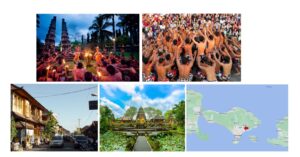“Do you think they’re on drugs, Yumiko?”
“I don’t think so.”
“Maybe it’s a trance then?”
No, I’m not talking about a typical day at Burning Man. Rather, my friend, Yumiko, and I are sitting in the stands of a dance hall, watching a traditional Kecak dance in Bali, Indonesia. Never heard of it? The Kecak dance looks something like this: In the center of the stage you find a series of costumed dancers, playing out scenes from Hindu mythology. Gathered around them are a few dozen bare-chested men, swaying and chanting to the music. As the dance continues, the chorus of men pick up the pace of their chanting, from “kecak, kecak” to “kecak-kecak-kecak-kecak kecak!”, ever more fevered and frantic as the performance proceeds. Occasionally one of the chorus stands up and starts writhing to the beat; at the climax, ALL the men, loud and frenzied, writhe and chant in unison. It’s a bizarre, exciting scene that can only be experienced in person to be understood. If then, even.

Situated in the center of Bali, Ubud is the place to see not only a Kecak dance, but all manner of Balinese dances. When I was there in 1987, seeing a dance show in Ubud was remarkably cheap – perhaps $5/performance. Something tells me the Ubud dance industry has developed a bit in the last 30+ years! Yumiko and I take in four performances while we’re in town, varying from slow and graceful dances to fast and berserk extravaganzas. Afterward, we stroll the streets of this charming, artist town, enjoying the slow pace and the many lovely galleries. A highlight is speaking with the semi-famous artist, Blanco, a contemporary of Picasso. A Balinese treasure, Ubud is a place to linger. It might even be a good place for a trance.
(How do you know what’s going on inside people? Are they dancing, or on they on controlled substances? It’s so hard to tell. One of the joys of travel is putting aside your judgment. “This isn’t my culture, so who am I to judge?” What if we could treat everyone we meet without judgment, both at home and abroad, as representatives of their own different, unique culture?)
